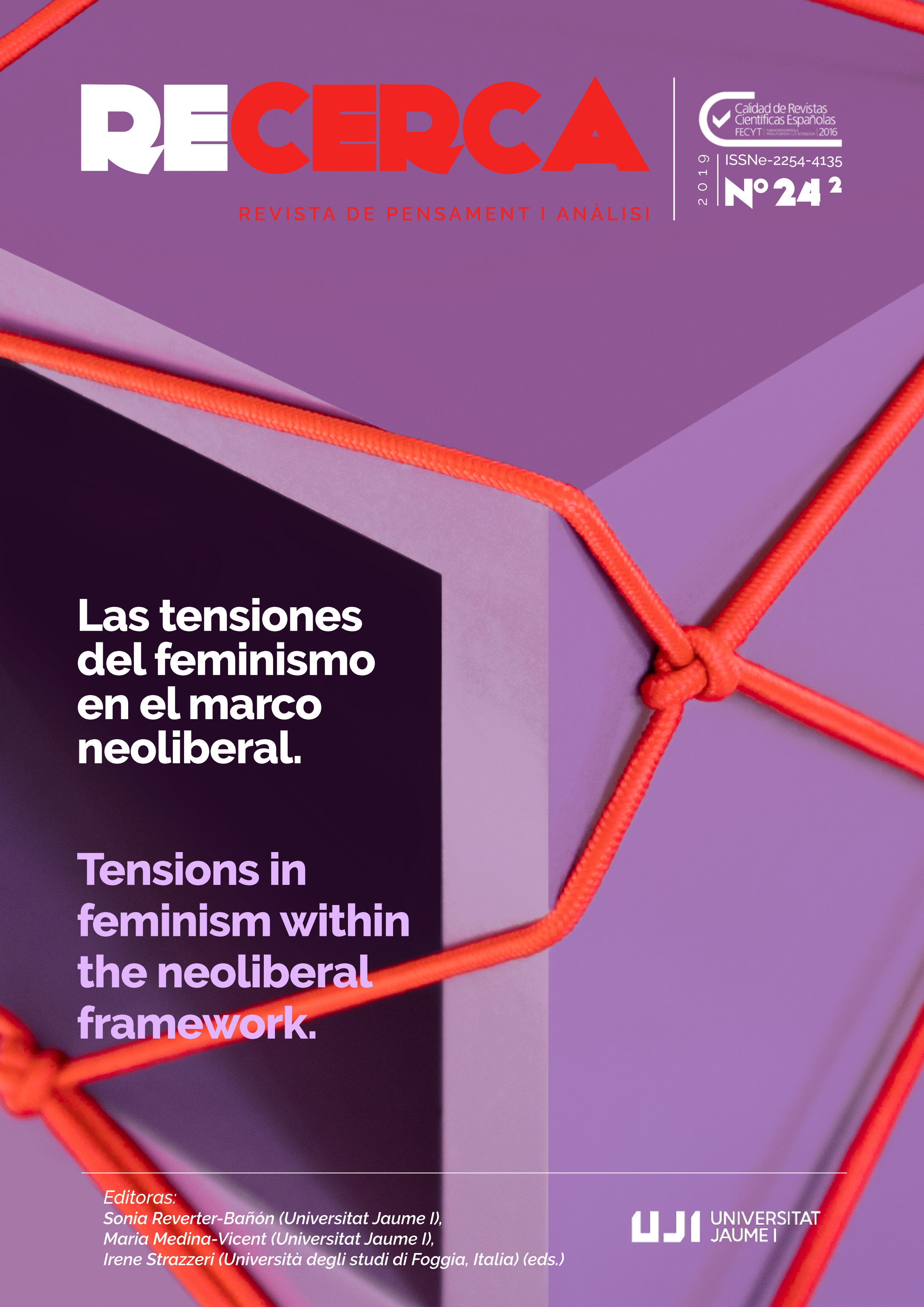Can erotic capital subvert masculine economy? Aesthetic work and the post-feminist approach to economics / ¿Puede el capital erótico subvertir la economía masculina? Aesthetic work y el enfoque postfeminista hacia la economía
Contenido principal del artículo
Resumen
The aim of this article is to elucidate whether and how the theory of erotic capital may function as a feminist tool to subvert the hierarchies and relations in current economy in favour of the empowerment and liberation of women. Thus, by analyzing the ways in which white, liberal feminism directly constructs its claims and petitions through the absorption of liberal epistemological dogmas, we intend to search the direct relation between the ideology developed by white, cisgender feminists and liberal economics and politics. This article demonstrates how a theory of erotic capital does not lead to a feminist subversion of economy, but reinforces the liberal economic and political system that relies on a masculine and androcentric epistemology. The subjectivity that women can achieve through the exploitation of erotic capital is only as consumers and not as productive agents.
El objetivo de este artículo es arrojar luz sobre si el capital erótico puede ser considerado una herramienta feminista para la subversión de las jerarquías y relaciones económicas y favorecer una liberación de las mujeres. Para ello, observaremos cómo el feminismo blanco y liberal, ha construido sus peticiones sin cuestionar los principios fundamentales de la economía liberal con el objetivo de demostrar la relación que existe entre el feminismo blanco liberal cisgénero y el sistema político-económico liberal. Este artículo demuestra que la implementación del capital erótico no conduce a una subversión feminista de la economía, sino que fortalece el sistema económico y político liberal que se fundamenta en una epistemología masculina y androcéntrica. La subjetividad a la que acceden las mujeres por medio del capital erótico es en clave de consumidoras.
Descargas
Detalles del artículo
Citas
Baudrillard, Jean (1981). For a Critique of the Political Economy of the Sign. St. Louis (MO): Telos Press.
Benjamin, Walter (2007). Illuminations. New York: Schocken Books.
Biklen, Sari, Marshall, Catherine, & Pollard, Diane (2008). Experiencing second-wave feminism in the USA. Discourse: Studies in the Cultural Politics of Education, 29(4), 451-469. doi: 10.1080/01596300802410185
Bordo, Susan (1986). The Cartesian Masculinization of Thought. Signs, 11(3), 439-456.
Browne, Victoria (2014). Feminism, Time and Nonlinear History. New York: Palgrave Macmillan.
Butler, Judith (2006). Precarious Life. The Power of Mourning and Violence. London: Verso.
Butler, Judith (2009). Frames of War. When is Life Grievable? London: Verso.
Butler, Judith (2012). Bodily Vulnerability, Coalitions and Street Politics. En Kuzma, Marta; Lafuente, Pablo, & Osborne, Peter (Ed.). The State of Things. Verksted Series (161-198). Oslo: Koenig Books.
Federici, Sylvia (2009). Caliban and the Witch. Women, the body and Primitive Accumulation. New York: Autonomedia.
Ferber, Marianne A., & Nelson, Julie A. (Eds.) (1993). Beyond Economic Man. Feminist Theory and Economics. Chicago: University of Chicago Press.
Gill, Rosalind (2007). Postfeminist media culture: elements of a sensibility. European Journal of Cultural Studies, 10(2), 147-166.
Hakim, Catherine (2011). Honey Money. The power of erotic capital. London: Allen Lane.
Kavka, Misha (2002). Feminism, Ethics, and History, or What Is the "Post" in Postfeminism? Tulsa Studies in Women's Literature, 21(1), 29-44.
Kristeva, Julia (1981). Women's time. Signs, 7(1), 13-35.
Mies, Maria (1998). Patriarchy and accumulation on a world scale: Women in the international division of labour. London: Zed Books Ltd.
Moreno Pestaña, José Luis (2016). La Cara Oscura del Capital Erótico. Capitalización del cuerpo y trastornos alimentarios. Madrid: Ediciones Akal.
Pérez Orozco, Amaia (2014). Subversión Feminista de la Economía. Apuntes para un debate sobre el conflicto capital-vida. Madrid: Traficantes de Sueños.
Robeyns, Ingrid (14 October 2000). Is There a Feminist Economic Methodology? Third Version. Retrieved from: http://www.ibrarian.net/navon/paper/Is_There_a_Feminist_Economic_Methodology__.pdf?paperid=357873
Rubin, Gayle S. (1984). Thinking Sex: Notes for a Radical Theory of the Politics of Sexuality. En Vance, Carol S. (Ed.). Pleasure and Danger. Exploring Female Sexuality (267-319). Boston: Routledge & Kegan Paul.
Valverde, Mariana (1992). When the Mother of the Race is Free: Race, Reproduction, and Sexuality in First-Wave Feminism. En Iacovetta, Franca, & Valverde, Mariana (Eds.). Gender Conflicts. New Essays in Women's History (3-26). Toronto: University of Toronto Press.


